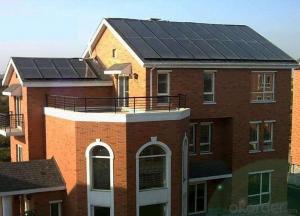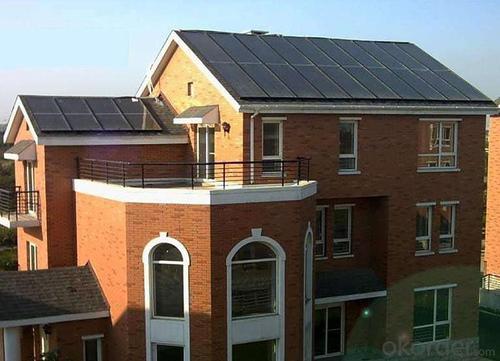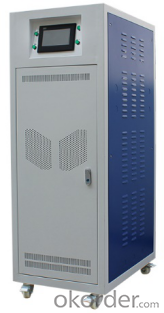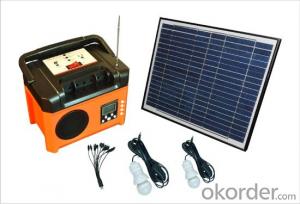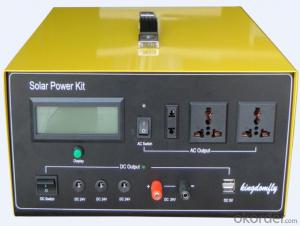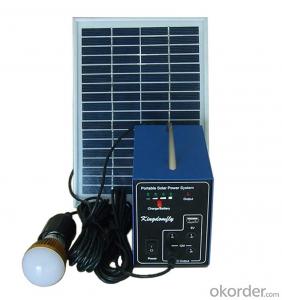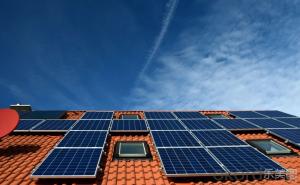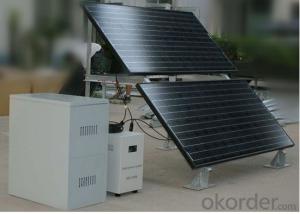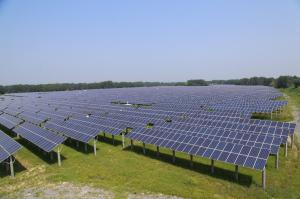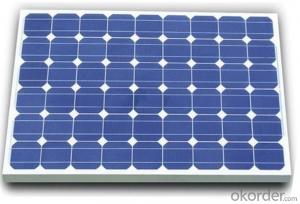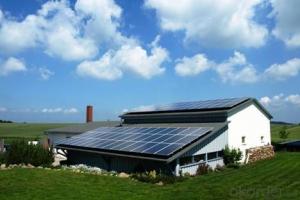25kw Solar Off-Grid Power System - Solar Energy Systems Bowral
- Loading Port:
- China main port
- Payment Terms:
- TT OR LC
- Min Order Qty:
- 1 set
- Supply Capability:
- 500 set/month
OKorder Service Pledge
OKorder Financial Service
You Might Also Like
Specification
1. Technical parameters of 5kw Solar Off-grid Power System 25KW
-Solar panels
Power(Pmax): 380 Wp
Dimension: 1956x992x40 mm
Working Voltage(Voc): 44.6V
Working Current(Imp):9.32A
Weight: 23 kg
- PV Inverter with controller
Efficiency: >85%
Pure sine wave
AC 220V/380V 50/60Hz output
Working Temp: 0℃~40℃
Battery overvoltage protection,undervoltage protection,overload protection,short circuit protection, overtemperature protection,etc.
900*700*1750mm 315KG
-Mounting Bracket
Flat roof or Ground: Galvanized steel type;
Tile roof: Aluminium type
Wind Load Resistanc: 45m/s
Snow Load: 2kN/m2
-GEL Battery of 12V 250Ah
520*269*228mm 68.5KG
-DC Cables
PV1-F
TUV/UL certificates
2. Products images
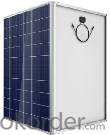
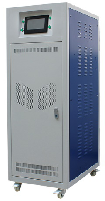
3. Product list
| No. | Item |
| 1 | Solar Panels |
| 2 | PV Inverter with controller built-in |
| 3 | Controller |
| 4 | Mounting racks |
| 5 | DC Cables |
| 6 | AC Cables |
| 7 | MC4 Connectors |
| 8 | GEL Battery |
| 9 | Combiner Box |
| 10 | Distribution box |
4. Remark
- In rainy days, the battery can support10000W load work 13hours.
-The maximum power load should not exceed 10.5KW (including inductive load impact: such as refrigerators, air conditioners, washing machines, etc. with motor load).
- The battery can be fully charged in 10-12hours under STC sunshine condition.
5. Package
Wooden case or carton pallet packing


- Q: Are there any safety certifications required for solar energy systems?
- Yes, there are safety certifications required for solar energy systems. The most common certification is the UL 1703, which ensures that the solar panels meet specific safety and performance standards. Additionally, some states and countries may have their own certification requirements for solar installations to ensure compliance with local safety regulations.
- Q: Can solar panels be installed on canopies or awnings?
- Yes, solar panels can be installed on canopies or awnings. This allows for the utilization of space that would otherwise not be used for solar energy generation. Additionally, it provides shade while generating clean and renewable electricity.
- Q: Can solar energy systems be used in cold climates?
- Yes, solar energy systems can be used in cold climates. While they may be less efficient than in warmer climates due to reduced sunlight intensity and shorter daylight hours, solar panels can still generate electricity in cold weather. Additionally, advancements in technology have made solar panels more resilient to extreme temperatures, making them suitable for use in colder regions.
- Q: How does the presence of nearby power lines affect the performance of solar panels?
- The presence of nearby power lines can have both positive and negative effects on the performance of solar panels. One of the positive effects is that power lines can provide a stable source of electricity to supplement the solar panels' energy production. During cloudy or low-light periods, when solar panels may not generate enough electricity, power lines can ensure a consistent power supply. This can be especially beneficial for residential or commercial properties that heavily rely on solar energy and cannot afford any interruptions in their power supply. On the other hand, the proximity of power lines can also have some negative impacts on solar panel performance. One significant issue is shading. Power lines often cast shadows on solar panels, which can reduce their overall output. Even a small amount of shading on a solar panel can significantly decrease its efficiency, as it disrupts the flow of photons and reduces the amount of sunlight that can be converted into usable electricity. Furthermore, electromagnetic interference (EMI) can occur when solar panels are placed near power lines. EMI can disrupt the normal functioning of solar panels and interfere with their ability to convert sunlight into electricity. This interference can lead to a decrease in overall energy production and efficiency. It is important to note that the specific impact of nearby power lines on solar panel performance can vary depending on various factors such as the distance between the power lines and solar panels, the angle and orientation of the panels, and the design and quality of the solar panels themselves. To mitigate these potential issues, it is recommended to carefully plan and design the installation of solar panels, taking into consideration the proximity of power lines. This may involve adjusting the angle and orientation of the panels to minimize shading and positioning them in areas where there is minimal electromagnetic interference. Additionally, regular maintenance and cleaning of the solar panels can help optimize their performance, regardless of the presence of nearby power lines.
- Q: How do solar energy systems impact job training and skill development?
- Solar energy systems impact job training and skill development by creating a demand for skilled workers in the renewable energy industry. As the solar industry continues to grow, there is a need for individuals with expertise in installation, maintenance, and repair of solar panels and other related equipment. This demand for skilled workers provides an opportunity for job training programs to develop and offer courses that equip individuals with the necessary skills to enter the solar energy workforce. Consequently, solar energy systems contribute to job creation and skill development in the green energy sector.
- Q: Can solar energy systems be used in areas with limited access to information technology?
- Yes, solar energy systems can be used in areas with limited access to information technology. Solar energy systems do not necessarily require advanced information technology for their operation. Basic knowledge and skills, such as understanding how to install and maintain solar panels, can be sufficient for utilizing solar energy in such areas. Additionally, solar energy systems can be designed with simple and user-friendly interfaces, making them accessible to individuals with limited technological resources or expertise. Therefore, even in areas with limited access to information technology, solar energy systems can still be successfully implemented and utilized.
- Q: What is the role of microinverters in a solar energy system?
- Microinverters play a crucial role in a solar energy system as they convert the direct current (DC) produced by individual solar panels into alternating current (AC) that can be used to power homes and businesses. Unlike traditional string inverters, microinverters are installed on each panel, allowing for better energy production and system performance, even in shaded or partially shaded areas. Additionally, microinverters enable real-time monitoring of each panel's performance, simplifying maintenance and troubleshooting processes.
- Q: How to calculate the income of photovoltaic system
- There are two kinds of algorithms, one for the total solar energy and the total electricity consumption, a solar photovoltaic power generation in real-time and real-time electricity.
- Q: Can solar panels be used to power streetlights?
- Yes, solar panels can be used to power streetlights. Solar energy can be converted into electricity and stored in batteries, which can then be used to power the streetlights during the night. This renewable energy source is increasingly being employed to reduce reliance on traditional power grids and promote sustainability.
- Q: Can solar energy systems be used for powering military or defense installations?
- Yes, solar energy systems can definitely be used for powering military or defense installations. In fact, many military and defense organizations around the world are increasingly adopting solar energy systems as a reliable and sustainable source of power for their operations. There are several reasons why solar energy systems are suitable for military and defense installations. Firstly, solar power is a renewable energy source that is abundant and widely available. This means that military installations located in remote or off-grid areas can still have access to electricity without relying on traditional fossil fuel-based generators, which can be expensive and logistically challenging to transport and maintain. Secondly, solar energy systems offer a decentralized power supply option. This means that military installations can become less reliant on vulnerable and centralized power grids, reducing their susceptibility to power outages or attacks on critical infrastructure. Solar panels can be installed on rooftops, parking lots, or unused land within the military base, making effective use of available space. Furthermore, solar energy systems require minimal maintenance compared to traditional power generation methods. This is particularly advantageous for military or defense installations located in remote or hostile environments, where regular maintenance and fuel supply for generators may be difficult or risky. Solar panels are durable and have a long lifespan, requiring only periodic cleaning and routine inspections. In addition to their reliability and resilience, solar energy systems also offer economic benefits. By reducing reliance on fossil fuels, military installations can lower their operational costs and potentially save significant amounts of money in the long run. The funds saved can then be allocated to other critical defense needs or used for research and development of advanced military technologies. Moreover, deploying solar energy systems for military installations aligns with the global trend towards clean and sustainable energy solutions. It demonstrates a commitment to reducing greenhouse gas emissions and mitigating the impact of climate change, contributing to the overall sustainability goals of military organizations. Overall, solar energy systems are a viable and practical option for powering military or defense installations. They offer reliability, resilience, cost savings, and environmental benefits, making them an attractive choice for military organizations seeking to optimize their energy supply and reduce their carbon footprint.
Send your message to us
25kw Solar Off-Grid Power System - Solar Energy Systems Bowral
- Loading Port:
- China main port
- Payment Terms:
- TT OR LC
- Min Order Qty:
- 1 set
- Supply Capability:
- 500 set/month
OKorder Service Pledge
OKorder Financial Service
Similar products
Hot products
Hot Searches
Related keywords
